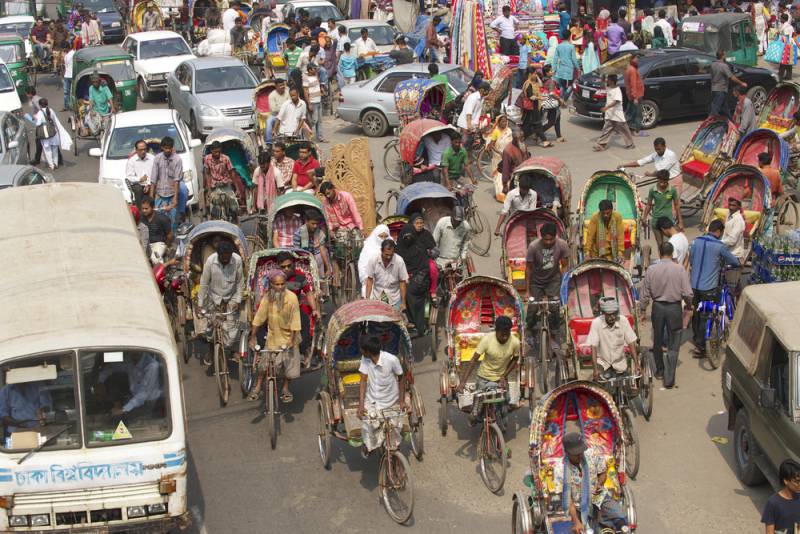Outspoken people in South Asia have been silenced by those who believe only one truth should exist.
Avijit Roy, a Bangladeshi writer and an acclaimed champion of “secularism” and freedom of expression, was killed on the streets of Dhaka on February 26. To deserve this brutal public execution, he “committed” two crimes. First, he had an opinion not shared by others in Bangladesh. Second, much of what he believed in was openly expressed through Mukta-Mona (Free Mind), a Bengali blog he established after moving to the United States in 2007.
Roy was not the first to be hounded or killed in Bangladesh for his opinions, and he will not be the last. But this is not only a Bangladeshi phenomenon. It is a form of global intolerance, which has a clear presence across South Asia.
In 2011, Salman Taseer, a Pakistani governor, was killed in Islamabad by one of his own bodyguards. Taseer’s crime was his defense of a Christian woman sentenced to death under Pakistan’s blasphemy laws. Lasantha Wickrematunge, the editor of The Sunday Leader, was killed in Colombo in 2009 for his criticism of the Sri Lankan government.
Taunted by people who had issues with his novel, Madhorubhagan, Indian writer Perumal Murugan decided to cease his passionate engagement with creative writing. He posted on Facebook in January 2015: “Perumal Murugan, the writer is dead. As he is no God, he is not going to resurrect himself. He also has no faith in rebirth. An ordinary teacher, he will live as P. Murugan. Leave him alone.” Though his body was not harmed, his emotions and his will to write were shattered.
In South Asian countries, books and films have been banned for similar reasons. Outspoken people in the region have been silenced and their ideas erased by those who believe that only one truth should exist. That is, one kind of powerful truth is expected to prevail, be it political, religious or both, within a larger domain of silence and acceptance. Many people have been killed in South Asia as a result of the muzzling of voices. Going by the nature of state (in)action in South Asia and the lackluster public opinion, these kinds of actions will continue.
Kalamas
Whenever I am confronted with this discomforting expansion of silence and the prevalence of a single claim for “truth” that must hold sway in South Asia, I am always reminded of an encounter attributed to a group of people known as the Kalamas, who lived in Kesaputta nearly 3,000 years ago. The Kalamas lived, thought and debated within the borders of what we call South Asia today.
But they also had encountered the specter of a singular truth and its rhetoric for superiority in their time. The Kalamas’ question to the Buddha was to figure out how to “know” what was “right.” According to the narrative, they asked the Buddha: “Lord, some teachers come to Kesaputta, expounding and glorifying their own doctrines. But as for the doctrine of others, they abuse them, disparage them, deprecate them, and pull them to pieces. Other teachers, on coming to Kesaputta, do the same thing. When we listen to them, we feel doubt and uncertainty as to which of these teachers are speaking truth and which are lying.” What is expressed here has an uncanny similarity with what we see in modern-day South Asia.
The Buddha gave the following response:
“Come, Kalamas. Don’t go by reports, by legend, by traditions, by scripture, by logical conjecture, by inference, by analogies, by consistency with your own laws, by probability, or by the thought, ‘This [sic] contemplative is our teacher.’ When you know for yourselves that ‘these mental qualities are unskillful; these mental qualities are blameworthy; these mental qualities are criticized by the wise; these mental qualities when acted on lead to harm and suffering’ then abandon them. When you know for yourselves that ‘these mental qualities are skillful; these mental qualities are blameless; these mental qualities are praised by the wise; these mental qualities when acted on lead to well-being and happiness’ then keep following them.”
Surely, this encounter, in terms of the circumstances, the question posed and the response given is not about religion. Instead, this has to do with the freedom to think and freedom to express, and more importantly, to have the choice and the right to do these things.
This is a state of logic and commonsense that prevailed in the minds of thinking people in South Asia all these years ago. I find it very sad, when we talk of the past with much rhetoric and virulence these days that we often forget what was truly unique in the past and remember and recall only what might best be left in the haziness of history and myth.
Today’s killings and the anticipated silence through these acts clearly show a very radical shrinking of our public sphere, a relentless encroachment of our collective conscience and a dismantling of our collective intellectual traditions. What we see is an emergent fear of the plurality of ideas and an intolerance of engaged and reflective dissent.
Muzzling Freedom, Killing Dissent
In these grim circumstances, when students at the South Asian University in New Delhi associated with the students’ blog, Rickshaw, organized a “public meeting” on the theme, “Muzzling Freedom, Killing Dissent: South Asian Scene,” taking the killing of Avijit Roy as its point of focus, I wondered what it meant for the university, and by extension for all South Asians. I also wondered if it would mean anything at all.
Students and faculty members in the panel expressed what Roy’s murder and the larger issues surrounding it meant to them. Considering the student and faculty population in the university, most people had other, possibly more important things to do, going by their absence. This is also indicated by the South Asian polity’s inactivity in the regions’ larger crises, including the intolerance of ideas and dissent. If issues such as the shrinking public sphere do not touch our house, salary, scholarship or our right to buy a car, the killings and dismantling of the collective conscience necessary to expand the singular truth might prevail. We can, as we have seen in many parts of the region, be contended with gleaming highways, chandelier-hugging five-star hotels, urban beatification and other manifestations of “development.”
It seems this is the kind of reality that poet Rudramurti Cheran wrote in another context as “the irresponsibility of distance.” If so, this means that people perpetuating the intolerance of the plurality of ideas that has become endemic in South Asia are not merely religious and political extremists as often claimed. The silence of ordinary and often reasonable people is as culpable. So the small “public meeting” at South Asian University is not going to change the direction of the region’s future or the way its citizens think for sure. But it indicates that our collective conscience still flickers on and off and sometimes can be seen above the glitter of irrationality and disinterest.
*[A version of this article was also featured on Sasanka Perera’s blog, Blue Moon.]
The views expressed in this article are the author’s own and do not necessarily reflect Fair Observer’s editorial policy.
Photo Credit: Dmitry Chulov / Shutterstock.com
 We bring you perspectives from around the world. Help us to inform and educate. Your donation is tax-deductible. Join over 400 people to become a donor or you could choose to be a sponsor.
We bring you perspectives from around the world. Help us to inform and educate. Your donation is tax-deductible. Join over 400 people to become a donor or you could choose to be a sponsor.
Support Fair Observer
We rely on your support for our independence, diversity and quality.
For more than 10 years, Fair Observer has been free, fair and independent. No billionaire owns us, no advertisers control us. We are a reader-supported nonprofit. Unlike many other publications, we keep our content free for readers regardless of where they live or whether they can afford to pay. We have no paywalls and no ads.
In the post-truth era of fake news, echo chambers and filter bubbles, we publish a plurality of perspectives from around the world. Anyone can publish with us, but everyone goes through a rigorous editorial process. So, you get fact-checked, well-reasoned content instead of noise.
We publish 2,500+ voices from 90+ countries. We also conduct education and training programs
on subjects ranging from digital media and journalism to writing and critical thinking. This
doesn’t come cheap. Servers, editors, trainers and web developers cost
money.
Please consider supporting us on a regular basis as a recurring donor or a
sustaining member.
Will you support FO’s journalism?
We rely on your support for our independence, diversity and quality.








Comment